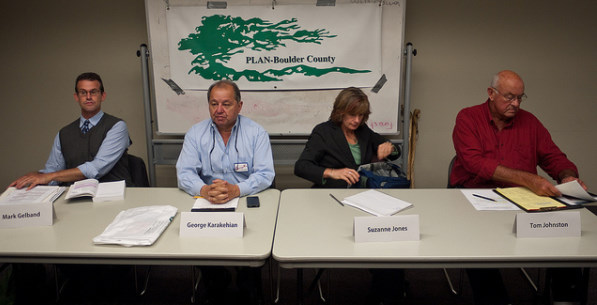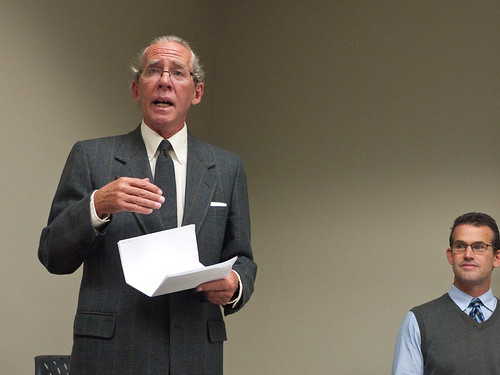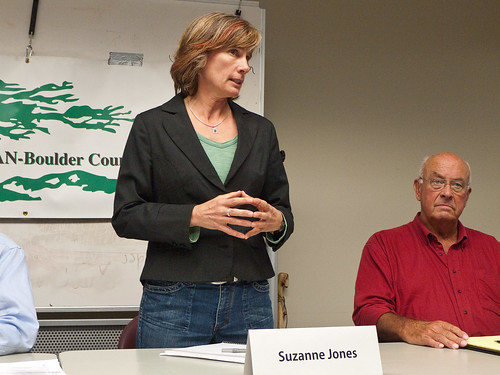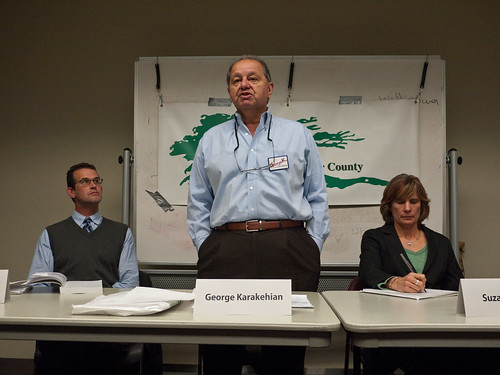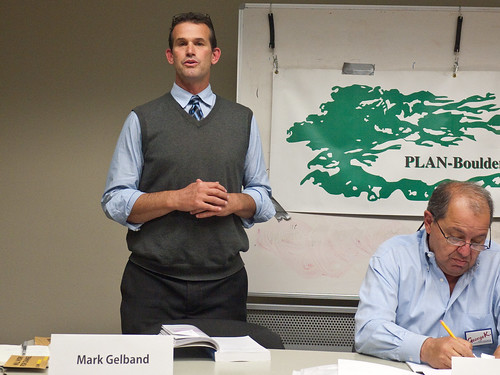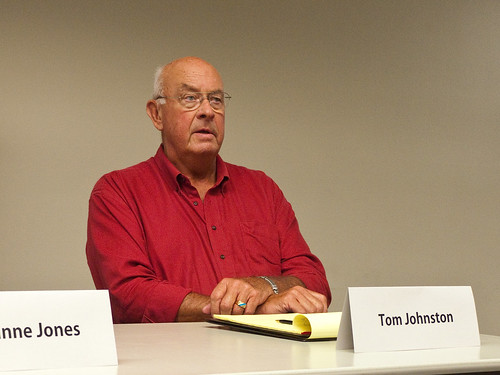The second PLAN-Boulder County forum for City Council candidates (September 16, 2011) featured Mark Gelband, incumbent George Karakehian, Suzanne Jones, and Tom Johnston squaring off over municipalization and affordable housing, among other issues, before a packed audience at the Boulder Public Library. Moderator David Grimm, former CIO for the City of Boulder, kicked off the discussion by giving each candidate 90 seconds for an introduction.
Mark Gelband said Boulder needs a new voice on council. He described himself as an environmentalist who eats organic vegetables and produces his own energy with solar panels on his roof, but he sees a chasm between the leadership in the city and the economic needs of many Boulder residents, such as young families and those on fixed incomes. He said he wants to support entrepreneurs who understand that being green and growing a business can go hand-in-hand.
George Karakehian said that when he was first running for council in 2009, he campaigned on the platform of getting the city on a new course. The city has made progress since then, he said, but there’s more to do. His priorities are promoting good jobs, improving the transportation infrastructure, keeping city finances on track, promoting economic vitality, and seeing that city taxes are well spent. He emphasized keeping jobs and shopping dollars in Boulder, and being friendly to both the environment and business.
Suzanne Jones said she’s running for council because she loves Boulder. She cited open space, the Pearl Street Mall, and the bicycle transportation network as things she loves and the kinds of policies she wants to further. She spoke of her 20 years of public policy experience, locally on the Environmental Affairs Board and on the city’s Blue Ribbon Commission, and as regional director of the Wilderness Society. She promised to find solutions that work “on the ground” for issues like land use and energy.
Tom Johnston said he’s retired, will be 73 years old by election day, and has lived in Boulder for 53 years. He was on the YMCA board for nine years, and was active with the Jaycees and Scouts. He feels it’s time for less government, and listed flashing crosswalks and traffic circles as examples of places where the city has overreached. He is particularly concerned about the city’s request for $49 million in bonding authority to address deferred maintenance, asking rhetorically whether this indicates mis-management of city finances. He said council should focus on city issues.
David Grimm then asked the candidates a series of questions.
What is the most important city issue today, other than municipalization, and why?
Gelband: The biggest environmental issue is the 60,000 single-occupancy vehicles per day on US 36. We should look at how city policies have created that problem, and how changing them can help solve it. In-commuting and affordable housing go hand-in-hand, and the way to meet demand for affordable housing is by increasing the supply of housing.
Karakehian: Economic vitality is paramount. The city has bucked the economic trends so far, but it runs on sales tax to fund transportation, parks, and so on, and I’m the one to have on council to protect the revenue stream. We also need to be sure to retain the jobs at the federal labs and good relations with CU.
Jones: I agree with the previous two, but municipalization really is the biggest issue. Energy — where we get it and how we use it — is the critical factor for the economy and the planet. Boulder is at a historic junction; it’s an opportunity for the city to set itself up for the future by unleashing innovation, growing technological know-how in the city, and set an example for others.
Johnston: Municipalization is the right idea at the wrong time. Most of all it’s an economic concern: why are we risking millions of dollars when the city needs it elsewhere, such as for affordable housing? Jobs and affordable shopping (and the loss of revenue to big-box stores like Costco outside of Boulder) are other “spokes in the wheel” to be considered in conjunction with affordable housing.
What are the next steps for the city regarding reducing carbon emissions?
Karakehian: For the next five years, our hands will be full with municipalization if 2B/2C pass. I’d like to work to get people off the grid first, and then see how things look. Programs available through the county and Xcel can help with that.
Jones: We should reduce our energy usage, and look at where it’s coming from. We should address emissions from transportation, including exploring a community-wide Eco Pass. Solar gardens are another good option. Let’s get creative; businesses are out there looking to unleash new ideas.
Johnston: 60,000 single-occupancy vehicle trips a day on one highway is crazy. We should correct the transportation system, getting people to walk and bike and take cars off the road. With enough rooftop solar, maybe we wouldn’t need a grid. Are we buying a dinosaur?
Gelband: How many people in this room have gotten a HERS rating on their houses? [Not many hands up.] How many people buy 100% Windsource power? [Lots of hands up.] How many people’s houses are completely net-producing to the grid? [Few hands up.] The first step happens at home. Go home and do these things: improve your own life, walk your talk. Before asking the city to spend $300-600 million, consider what you’re doing on your own.
Do you advocate a commercial energy conservation ordinance?
Jones: Yes. This is pivotal; everyone should do their part to save energy. First we should address commercial buildings in a way that minimizes the burden but creates strong incentives, and follow up with regulations.
Johnston: I’m for less government. Government shouldn’t be legislating to individuals — individuals can do the right thing on their own, as Mark has just shown. You can’t even cut down a tree in this city without calling a certified arborist!
Gelband: The city talks out of both sides of its mouth on this issue. Additional regulation of commercial buildings would hurt those least able to afford it. When I was a landlord, I passed additional cost on to my tenants, and the same would happen here.
Karakehian: When SmartRegs came before council, I was worried. The votes for it were there, so my job was to get it to the place where it was negotiated with the landlords and BARHA, not forced. We extended the time period for compliance, and we did a review of the cost for owners and it was reasonable. As a result there have been few complaints. I’d approach the commercial side the same way. And I’d also work to address owner-occupied residential buildings.
Identify one successful development in Boulder, and one unsuccessful development, and explain your thoughts.
Johnston: Valmont Park, with the new bike park and dog area, has been a shining star. The only downside is the old egg farm building — it’s nice it’s being reused, but it’s an eyesore. The RTD FasTracks project has been a fiasco.
Gelband: The Holiday neighborhood has been a success: it has a mix of housing, it’s relatively affordable, walkable, a place for young families. But people are concerned about the amount of permanently affordable housing there, which reduces the number of market-rate units. An unsuccessful project is Two Nine North on 30th Street. There’s nothing interesting, pleasing, or valuable about it. The Twenty Ninth Street Mall is unsuccessful. The transit village, with the depot placed where the train can’t get to it, is looking unsuccessful.
Karakehian: Speaking of the depot, I moved it the first time with the Jaycees, when the city was planning to tear it down. How things have changed! But getting to the question, the Peloton is a poster child of bad development, and it hasn’t been very financially successful, to boot. Red Oak Park and the west end of Pearl Street are examples of good development: they’re walkable and fit in well.
Jones: I agree with most of those. Holiday is a shining example of mixed use. It’s a place you want to go to, with community parks and gardens, on mass transit. Red Oak Park is also great. The Peloton is too big and seems plopped in the middle of nowhere. For better development in the future, we should look at micro-zoning for mobile home parks, and allowing more ADUs as a way to keep the feel of neighborhoods but add housing.
What is the best use for the Area III Planning Reserve?
Gelband: I don’t know the best use, but it should be some sort of commercial use, and also a place my 75-year-old father could walk. It should be open to development. Another big-box store would be good. I can’t buy underwear for my kids at Nordstrom’s; I go to Target. Another big-box to compete with Target would help working people.
Karakehian: I don’t know the best use either. The area is unique and provides an opportunity available nowhere else in the community. It’s the last piece of Boulder’s puzzle, so any use would have to rise to the top. If Naropa really were going to leave Boulder for want of space, that would qualify. Naropa is part of Boulder’s brand.
Jones: The best use is as a reserve, left to those who come after us to develop if necessary. We should focus on infill opportunities first, before opening Area III.
Johnston: It’s time to sell our open space land in Jefferson County so we can afford to buy a reserve.
What is the ideal population for Boulder?
Karakehian: The population feels pretty good right now. When I moved to Boulder in the ‘70s from Fort Collins for a girl (who’s now my wife), I frankly didn’t care for it. But I love Boulder for what it is now. I love the parks and the open space, and I brag about the place, so we don’t need to be changing it much. We are who we are; we should have nice quiet growth.
Jones: We’re a great city, with strongly held values, and we’ve gotten a lot of things right. We’re a good size, and increases should be modest, along transit corridors.
Johnston: The perfect population is 100,001, because more federal funds are available for cities over 100,000. More growth will come, but we have a nice community — we’ve done it right, so why mess it up?
Gelband: I love Boulder with its open space and as a place where you can walk or bike to work. I don’t know the ideal population, but the current jobs-housing balance is a problem. Florence, Italy is one of the most beautiful places in the world; it has the same geographic area as Boulder, but the population is 400,000. We don’t want 400,000 people here, but the pressure will be for more density.
How should our affordable housing program be changed, and why?
Jones: Our goal is for 10% of the housing stock to be permanently affordable, and we’re currently at 6%. We won’t solve the problem, but we need to keep chipping away at it. The inclusionary zoning program needs more funding to be able to do more, and we should also loosen the zoning for ADUs and OAUs.
Johnston: Using “Boulder” and “affordable housing” in one sentence is a paradox. We need to look beyond just affordable housing to also providing jobs and affordable shopping — a whole program. Maybe instead of seven sister cities, Boulder should have two sister cities and some sister neighborhoods, inside the city.
Gelband: The city speaks out of both sides of its mouth on this. We want affordable housing, but we just passed the compatible development rules that reduce the ability for people to create ADUs and OAUs. My family would love to build a carriage house for the woman who provides us child care, but the rules prevent it. The city downzoned Whittier and we’re about to downzone Goss-Grove, despite that these neighborhoods have the opportunity to provide affordable family housing.
Karakehian: I championed the affordable housing task force to look at this. New taxes for affordable housing won’t fly, so we need to look at public-private partnerships and provide incentives. Allowing more ADUs and OAUs is also a good idea. And why are we putting affordable housing on the most expensive corner in Boulder Junction? We could provide more housing if we put it in lower-cost places.
How would you like Boulder to be different in 30 years?
Johnston: At 73 years old, projecting 30 years into the future is hard! The city is a wonderful place to live, but it should be more responsible to its commitments, like providing promised parks in Table Mesa and by the Elks Lodge. We have $170 million in deferred maintenance; we should show fiscal responsibility and take hold of our financial problems.
Gelband: First, I’d like to see a greater diversity of voices representing the community, in the geographic sense and in perspective — a mobile home resident, for example. Second, we should get beyond our false dichotomy between the environment and the economy.
Karakehian: I’d like to see better transportation infrastructure, because that 60,000 trips on US 36 we’ve been talking about will only increase. I’m on a county master plan task force for transportation to address this and keep us from becoming a gridlocked city. We need to create walkable neighborhoods and add development on transit routes.
Jones: I’d like more of the same, but even better: more bikes, more walking, bus rapid transit, fewer cars (and I want those to be hybrids!). I want a cutting-edge energy system that can be a model for the nation; a vibrant university and government labs; a diversity of people and economic levels. I want to have met our zero-waste goals and our Kyoto goals, and I want us to be an incubator for businesses. And I want us to part of a vibrant region, beyond just Boulder.
At the end there was time for just a few questions from the audience.
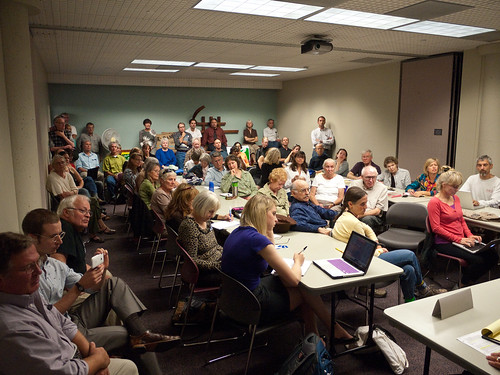 What is your position on ballot items 2B and 2C?
What is your position on ballot items 2B and 2C?
Gelband: I’m unequivocally not supporting them. It’s not prudent to spend $300 million to $600 million on lines and poles, and not get one kilowatt of renewable energy out of it. There are no limits on the bonding amount, it will double the utility tax, and we’ll litigate it for five years. Put solar on roofs, and even in my backyard, instead.
Karakehian: I have concerns about getting into a five-year battle during which we won’t do anything to green our power supply. Let’s work to get people off the grid, before buying the grid. CU is talking about getting off the utility accounts, and it’s 5-10% of the city’s use. In other words, the utility’s biggest rate-payer could go away, which would be devastating. There are good off-ramps, but we’ll spend $10 million and not green our energy supply at all. The city shouldn’t be in the risk business!
Jones: I’m enthusiastically voting for it. I don’t see it as locking us into a path, but as opening a door. We’ll get a ruling early on from FERC regarding costs, so the risk is low. The occupation tax increase is modest, about $1/month. If the items pass, we’ll have more options and better negotiating power, and Xcel can always come back with a better offer, or we could take a hybrid approach.
Johnston: I’ll vote no. Every tax is modest until you add them all together, and we only get 45 cents back on a dollar of tax investment. It’s not the time to invest in something so uncertain.
Who are your political heroes?
Karakehian: Tom Eldridge. Tom was the person who affected me the most politically, he was great for Boulder, and he was my best friend.
Jones: Will Toor. He has a great mind, a willingness to hear people out, and he’s always looking for good solutions. He’s truly of this city.
Johnston: Barry Goldwater. I’m a political conservative, a registered Republican. In 1964, I was told if I voted for Goldwater, we’d be at war within six months. I did, and we were. Locally, if there’s any politician I admire, it’s Bob Greenlee.
Gelband: Bill Clinton. During his administration, the country was prospering, and Clinton knew how to bring people together. He had challenges in his personal life, but it was a hopeful time. That works for me: I’m a hopeful person, I was born an optimist, I love life.
Please express your political philosophy in a bumper sticker.
Jones: A mix of “Work hard and do good things” and “Work hard, play hard.”
Johnston: “Less government, more responsibility.”
Gelband: “Trust people to do good things.”
Karakehian: “Two more years!” More seriously, “Common sense in government.”
The final PLAN-Boulder County candidate forum will be held at noon on Friday, September 23rd in the main library’s Boulder Creek Room. It will feature candidates Fenno Hoffman, Stephen Keenan, Dan King, and Lisa Morzel, with moderator John Tayer.


